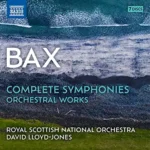Bax Complete Symphonies
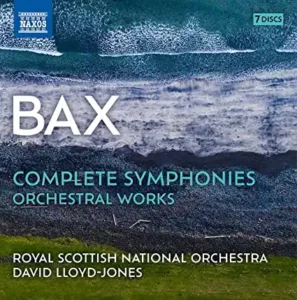 David Lloyd-Jones’s classic set of Bax Symphonies is released as a box set on Naxos
David Lloyd-Jones’s classic set of Bax Symphonies is released as a box set on Naxos
Bax: The Seven Symphonies – David Lloyd-Jones, conductor; The Royal Scottish National Orchestra. Naxos 8.507014
A review by Richard R. Adams
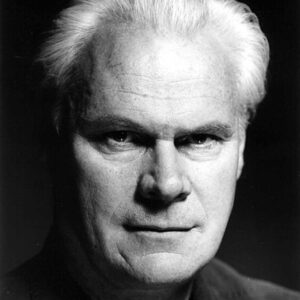 Almost 20 years have passed since the 50th anniversary commemoration of the death of Sir Arnold Bax and the concurrent release of Vernon Handley’s complete set of Bax symphonies on Chandos. That set received enormous amounts of media attention and became the ‘go-to’ set for the Bax symphonies. Overlooked in the excitement was the release of the final installment of David Lloyd-Jones’s Bax symphony cycle on Naxos (No. 7 and Tintagel). The Naxos set had been released in single installments whereas the Handley set was issued complete in a handsome green box that included a fascinating interview with Maestro Handley. The Handley collection went on to win that year’s Gramophone Orchestral Recording of the Year Award. The Naxos set, while greatly admired, was sidelined, which is why its re-release as a complete set is so welcome as it provides a new opportunity to reassess these hugely enjoyable performances by a top British orchestra led by a much-admired and always reliable conductor.
Almost 20 years have passed since the 50th anniversary commemoration of the death of Sir Arnold Bax and the concurrent release of Vernon Handley’s complete set of Bax symphonies on Chandos. That set received enormous amounts of media attention and became the ‘go-to’ set for the Bax symphonies. Overlooked in the excitement was the release of the final installment of David Lloyd-Jones’s Bax symphony cycle on Naxos (No. 7 and Tintagel). The Naxos set had been released in single installments whereas the Handley set was issued complete in a handsome green box that included a fascinating interview with Maestro Handley. The Handley collection went on to win that year’s Gramophone Orchestral Recording of the Year Award. The Naxos set, while greatly admired, was sidelined, which is why its re-release as a complete set is so welcome as it provides a new opportunity to reassess these hugely enjoyable performances by a top British orchestra led by a much-admired and always reliable conductor.
This re-release may also be Naxos’s way of acknowledging the passing of one of its long-time house conductors who made a wonderful series of recordings of British music starting in the 1990s and continuing on until about 10 years ago when frail health made it necessary for him to retire. Lloyd-Jones worked with several British orchestras, but he was most often associated with the Royal Scottish National Orchestra and his own Northern Philharmonia Orchestra that he helped create. Many collectors will have first come across David’s name from a 1970s Philips disc of Russian tone-poems with the London Philharmonic including the first recording of Mussorgsky’s original version of Night on Bald Mountain. Hyperion engaged David for a series of Constant Lambert recordings in the late 1980s and then when Naxos producer David Denton decided to record the Bax symphonies, he originally sought out Vernon Handley who had to refuse the offer as he was already committed to record the Bax symphonies for EMI Eminence; a project that was later cancelled. Naxos then approached Lloyd-Jones who was happy to take on the task despite being only moderately familiar with the music. 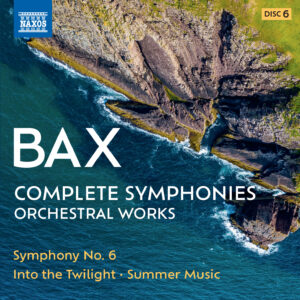
Lloyd-Jones initiated his series in 1995 by recording the Second Symphony, which he considered to be the best to immediately engage the orchestra in the project. Within a short period, he had recorded the First, Second, Third and Fifth symphonies before moving on to recording the Fourth, Sixth and Seventh in the early 2000s. Each release was well received and a top seller for Naxos although there were complaints about the dry acoustics of the Henry Wood Hall in Glasgow where the symphonies were recorded. That said, critics appreciated that Lloyd-Jones’s approach with the symphonies was leaner and meaner than that of Bryden Thomson on his earlier Chandos series from the 1980s. That early set had also suffered from sound problems as well as performances that emphasized atmosphere over structural cohesion. The Lloyd-Jones served as a corrective to the indulgent Thomson and at the time, several of the Naxos performances were considered revelatory as a result.
While the First Symphony was the second of the seven to be recorded, it was the first to be issued and it opens with two of Bax’s early and most Irish-inspired tone poems: In the Faery Hills and The Garden of Fand. Lloyd-Jones admitted he had a soft spot for Bax’s early orchestral music and his performances of these two masterworks are efficient and beautifully played by the RNSO. Lloyd-Jones’s approach to Bax is immediately clear with performances that are more brilliant than poetic and paced on the faster side. In my opinion, Thomson finds more poetry in Faery Hills and Handley more character in Fand but regardless, these are fine companions to a first-rate performance of the First Symphony, which is tremendously exciting and urgently paced. It is in this symphony especially where the fabulous brass of the RSNO is most on display – a constant highlight of this series. The recording did receive criticism for the dry and airless sound and the brass is very prominent – but thrillingly so.
Dry sound also impairs a fine performance of the Second Symphony, which is certainly superior to Handley’s surprisingly light-weight account on Chandos but it’s here where I miss the extra heft and weight of those earlier recordings by Myer Fredman on Lyrita and Thomson on Chandos. This is oppressive music and it requires a huge sounding orchestra and soundstage to make its full effect, which the earlier recordings certainly do but this Naxos falls short of. That said, it’s a fine performance and it comes with a powerfully urgent performance of November Woods, which has all the intensity that this Second is lacking in.
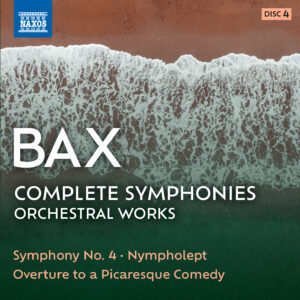 Lloyd-Jones recreates Sir Edward Downes’s coupling in his version of the Third Symphony (with The Happy Forest) that was for British RCA in 1969 – a recording that has shamefully never been released in any digital format. I wish I could say the Lloyd-Jones is superior to the old Downes recording but it lacks just that extra amount of personality that Downes, Handley and especially Barbirolli bring to Bax’s most popular symphony. That said, this recording is an improvement on Thomson’s sluggish performance for Chandos. Lloyd-Jones gives us a brilliant but not especially atmospheric performance of “The Happy Forest” – a tone poem in which Downes, so far, has no rival as an interpreter.
Lloyd-Jones recreates Sir Edward Downes’s coupling in his version of the Third Symphony (with The Happy Forest) that was for British RCA in 1969 – a recording that has shamefully never been released in any digital format. I wish I could say the Lloyd-Jones is superior to the old Downes recording but it lacks just that extra amount of personality that Downes, Handley and especially Barbirolli bring to Bax’s most popular symphony. That said, this recording is an improvement on Thomson’s sluggish performance for Chandos. Lloyd-Jones gives us a brilliant but not especially atmospheric performance of “The Happy Forest” – a tone poem in which Downes, so far, has no rival as an interpreter.
The Naxos recording of the Fourth Symphony dates from 2001 and is noticeably fuller and more ambient than its predecessors and as a performance it is as fine any other yet available. Lloyd-Jones keeps the tempo moving but he never short-changes the music’s grandeur or emotional thrust. His recording of the Overture to a Picaresque Comedy is light-years ahead of Thomson’s dreary account on Chandos and comes close to matching the electricity and humor of Hamilton Harty’s premiere and still definitive recording. We are also given a first-rate recording and performance of Nympholept, which is certainly as effective as Handley’s later Chandos recording and a good deal more successful than the earlier Thomson.
It’s interesting how the Fifth Symphony always inspires the best in its interpreters as is the case here with Lloyd-Jones. This is my favorite performance from the entire set. It’s obvious Lloyd-Jones responded warmly to this particular symphony as he invests the music with something more personal than his usual workmanlike approach. There is absolutely nothing to fault in this performance other than the recording is again on the dry side. The performance of The Tale the Pine-Trees Knew is certainly fine but not as poetic as Thomson’s marvelous account on Chandos.
 Lloyd-Jones again excels in the Sixth Symphony, which was the most critically acclaimed of the set and for good reason. This is a performance that truly blazes with intensity and here the RSNO surpass themselves in all departments. The recording is good too and there are many who regard this version as the best yet of what is arguably Bax’s orchestral masterpiece. I’m still partial to Norman Del Mar’s more romanticized account on Lyrita but Lloyd-Jones is easily the best digital recording made of this great symphony. Neither Handley nor Thomson really approach it.
Lloyd-Jones again excels in the Sixth Symphony, which was the most critically acclaimed of the set and for good reason. This is a performance that truly blazes with intensity and here the RSNO surpass themselves in all departments. The recording is good too and there are many who regard this version as the best yet of what is arguably Bax’s orchestral masterpiece. I’m still partial to Norman Del Mar’s more romanticized account on Lyrita but Lloyd-Jones is easily the best digital recording made of this great symphony. Neither Handley nor Thomson really approach it.
The companions for the Sixth include more workmanlike performance of Into the Twilight and Summer Music. These are the sorts of works in which Thomson excelled as he certainly knew how to bring out the ardor and atmosphere in Bax’s music better than anyone, but Lloyd-Jones is certainly very fine and this, along with his recording of the Fifth Symphony, remains the high point of the set.
Regrettably, the low-point of the set is with the final disc of the cycle. I give Lloyd-Jones credit for re-thinking the Seventh Symphony as this is a quick and impassioned performance of Bax’s most relaxed and contemplative symphony. Lloyd-Jones appears to be inspired by Boult’s premiere recording, which is similarly paced and while I find both performances fascinating, it’s not how I believe the Seventh Symphony should be played and especially in an acoustic that is as dry and boxy as with this recording. This is unquestionably the worst sounding of the seven discs and a clear example of how a flat and unflattering acoustic can ruin a performance.
Lloyd-Jones couples the Seventh with Bax’s most popular work, Tintagel, and it’s a fine performance that’s again robbed of its atmosphere by the dry acoustic. The Seventh Symphony is best served by Leppard’s beautiful recording on Lyrita as well as Handley’s recording on Chandos whereas there are any number of better Tintagels with my favorites being Handley on Chandos and Barbirolli on Warner (formerly EMI). 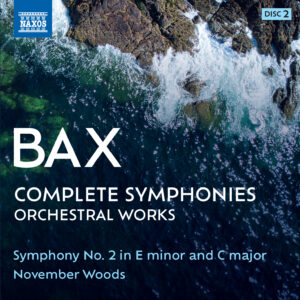
So, my overall opinion of this set is that it features fine, workmanlike performance of the first three symphonies and inspired performances of symphonies 4 thru 6 with the only real disappointment being the Seventh Symphony. How does it compare to Handley’s now classic set? In truth, it’s just about its equal as the Handley is also inconsistent with weaker performances of the Second and Sixth Symphonies – a real problem with that set. None of these digital accounts including those of Thomson come close to matching the sound that Lyrita provided for the LPO and New Philharmonia Orchestra back in 60s and 70s and those performances are also pretty close to definitive. Perhaps Handley remains the chief recommendation as it’s complete and has slightly better sound (although still not ideal) than the Naxos. Where the Naxos scores is that it includes several shorter orchestral works in mostly fine and sometimes great performances.
Certainly, someone new to the symphonies would do well to choose this wonderful compilation by David Lloyd-Jones and I’m grateful to Naxos for issuing these recordings together in one set as it’s a reminder of just what a fine conductor David Lloyd-Jones could be. That said, it is not the definitive set that we’re still waiting for. I think enough time has passed since the release of this and the Handley sets for a new contender to emerge to challenge the supremacy of the older Lyritas for both sound and performance. Perhaps a label outside the UK might take a chance with Bax with a non-British orchestra or conductor? BIS – are you reading this?

